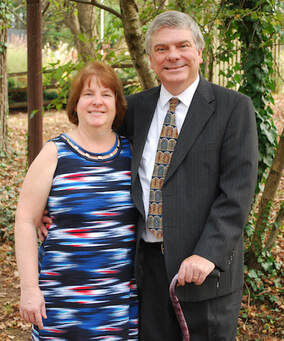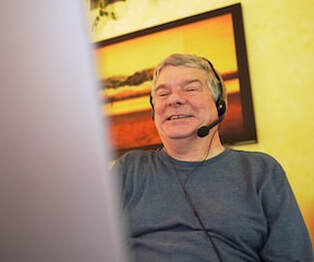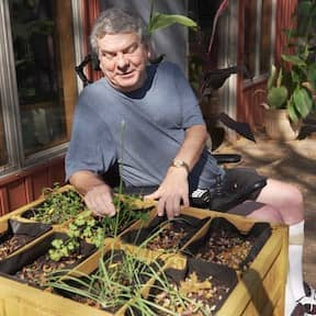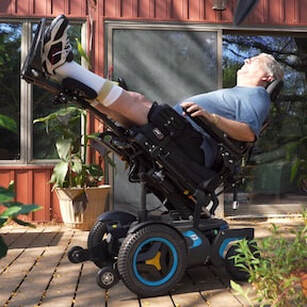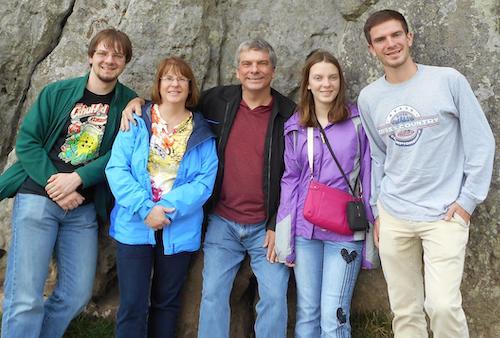|
Todd Kelly was a high school English teacher when he was diagnosed with ALS in 2013. With a slow-progressing case of ALS, the use of mobility equipment, and a supportive school community, he was able to teach for another six years and reach full retirement.
Since retiring, Todd has been an active advocate for the ALS community. He is a NEALS Research Ambassador, consumer reviewer for the federal ALS Research Program, and a member of the ALS Hope Foundation’s PALS Advisory Council. |
“When you get this diagnosis, you feel very alone. It's important to reach out to people and not let the loneliness of it define you and keep you in that dark space.”
Your ALS Guide interviewed Todd in August 2022—more than nine years after his diagnosis.
Tell us about your life before and after your diagnosis.
I was an English teacher for 35 years. I taught high school English, mostly 12th grade Advanced Placement. I also was the drama director for 30 of those years and built the sets.
In 2011, I started having pains and cramps in my legs. We couldn't figure it out until 2013 when I had foot drop. My left foot was just slapping the ground. I went to a neurologist who recommended I go down to Philly and see if I perhaps had some kind of neurological disease. And that's when I learned I had ALS.
Dr. Terry Heiman-Patterson and her multidisciplinary team at the ALS Center of Hope helped me sustain my quality of living, manage my evolving symptoms, adapt my daily activities, and prepare for my future. With adaptations, I was able to continue actively teaching high school English for a full six years beyond my diagnosis.
In 2011, I started having pains and cramps in my legs. We couldn't figure it out until 2013 when I had foot drop. My left foot was just slapping the ground. I went to a neurologist who recommended I go down to Philly and see if I perhaps had some kind of neurological disease. And that's when I learned I had ALS.
Dr. Terry Heiman-Patterson and her multidisciplinary team at the ALS Center of Hope helped me sustain my quality of living, manage my evolving symptoms, adapt my daily activities, and prepare for my future. With adaptations, I was able to continue actively teaching high school English for a full six years beyond my diagnosis.
What adaptations helped you continue teaching?
|
When I was diagnosed, we didn't know if it was going to be fast-progressing or slow-progressing, but I wanted to keep teaching as long as I could. We had to find ways that I could still get to school and function there. My feet were being affected, so I went and learned how to drive with hand controls. Being able to drive to school kept me employed for another five years.
|
|
At school, I used a cane, then a rollator, and finally a small wheelchair that could be assembled and disassembled very quickly. I would park it in the science classroom where they had an outlet and charge it there overnight. A teacher would usually meet me in the morning at the handicap spot and help me walk in with my stuff. I'd get into the wheelchair, go to my classroom, and teach using the wheelchair or rollator.
I loved teaching and I didn't want to lose it.
I loved teaching and I didn't want to lose it.
How did your students respond?
The students were fantastic. I was very concerned of their reaction initially because teachers don't like to show weakness. We're the people who are supposed to know everything and be in charge. It got to a point where I needed a lot of help. I couldn't do simple things like walking and checking homework without a chance of falling.
So I'd have to come up with a different method. I'd say to the kids, "Okay, everyone pass their homework up." So they'd all pass it up to me and I'd give them a five-minute reading assignment. They were really good about it. And then I would check the homework and pass it back, and we'd just talk about it.
If I needed help, they were always right there. They would jump up and help. I wouldn't say my students were always the greatest students, but they were really wonderful kids and people. What I saw was very affirming. It gave me a very positive idea that these kids, mostly seniors, were going out with the right attitude about helping other people.
A lot of times kids said that I inspired them by still teaching with this, and they inspired me back by their kindness and their willingness to help.
So I'd have to come up with a different method. I'd say to the kids, "Okay, everyone pass their homework up." So they'd all pass it up to me and I'd give them a five-minute reading assignment. They were really good about it. And then I would check the homework and pass it back, and we'd just talk about it.
If I needed help, they were always right there. They would jump up and help. I wouldn't say my students were always the greatest students, but they were really wonderful kids and people. What I saw was very affirming. It gave me a very positive idea that these kids, mostly seniors, were going out with the right attitude about helping other people.
A lot of times kids said that I inspired them by still teaching with this, and they inspired me back by their kindness and their willingness to help.
How does ALS affect your daily life now?
|
It affects my life a great deal. From the moment I get up until I go to bed, I have to deal with this. It takes me about an hour and a half to get going in the morning because I want to take a bath to warm up my joints. Then I do a number of stretching and other exercises. Then getting dressed is a very, very, very slow process. So it's about an hour and a half until I'm ready for breakfast.
|
|
|
I'm retired now because it got to a point where I couldn't continue working. It was just too exhausting. I'm still enjoying what I'm doing with my life, but I've had to change. I can't be active like I used to be. I used to do a lot of community theater. I can't do that anymore.
I use my computer, I read, I do puzzles. I do some gardening. We have what's called a herb trug that’s off the ground, so I can do a little bit of gardening there. And I can still talk with people and I can go out for dinner and things like that. I can still walk. It's a little herky-jerky, but I get it done. My arms are limited. I have to use one arm to push my other arm further up. They can't quite go that far in any one direction, but you adjust. I always have a long-handled gripper nearby, so if I'm working on a puzzle and a puzzle piece falls, I'm not going to try to get it off the floor because if I go down, I'm not getting up without help. |
We have smart speakers with pre-programmed numbers throughout the house, so if I do fall, I can just say, “Alexa, call my dad, or, call my brother." It's really helpful. I do have some devices set up in the house with the Alexa app so that I can turn things on and off. My wife's not a fan of Alexa. I think she's jealous that sometimes I talk more to Alexa.
Why do you use a power wheelchair when you can still walk?
|
I use it to get my feet up to prevent swelling. So I'll get in the chair and I'll raise the feet higher than my heart so that the blood flows down. I also use that time where I can get my arms back further and do some more stretches.
I also do some breath stacking, where you breathe in three times and it helps to basically stretch your airways and help your lungs expand. And my wife encourages me to use the power chair when I’m tired so I don’t fall. When I go out, the power wheelchair helps keep me from falling. I use it all the time outside. If I want to go in the yard, I can go out in the power wheelchair and get around. It's pretty doable that way. |
Wherever we go, we use the chair. It just saves me the exhaustion and the worry because otherwise it would be very easy for me to fall, especially if I'm concentrating on something else. And I don't want that to happen. I don't want to have some kind of serious injury because it'd be very difficult for me to recuperate from that.
The chair really frees me up to enjoy the experience and not worry about all the things that could go wrong. Sometimes it's challenging. You go different places that aren't really set up for wheelchairs. But for the most part, it's freed me to do some of the things I really want to do while I can still do them.
The chair really frees me up to enjoy the experience and not worry about all the things that could go wrong. Sometimes it's challenging. You go different places that aren't really set up for wheelchairs. But for the most part, it's freed me to do some of the things I really want to do while I can still do them.
How do you access the different parts of your home?
Our house is mostly a ranch house, but we do have a nice family room downstairs. So I have a stair glide that takes me down there. It's a good place for me to go to see the big TV and enjoy that. And I have a lift chair down there so I can sit down and get up off of that as well.
Getting into the house is nice because we have a ramp that was built out front. It came in pieces. We didn't end up paying for it because it was sponsored by an ALS organization. They came out and measured and designed it.
Getting into the house is nice because we have a ramp that was built out front. It came in pieces. We didn't end up paying for it because it was sponsored by an ALS organization. They came out and measured and designed it.
How else have ALS organizations helped?
There are organizations out there that are willing to help you. You just have to find them. And it's just not one organization. It's a number of them.
I'm very much dependent on my ALS clinic with the ALS Hope Foundation. They have been wonderful, not just in support at the clinic but also with education—helping me learn about this disease and helping me prepare for the next steps. They've loaned us different assistive devices as well.
The ALS Association of Greater Philadelphia paid for the ramp, which saved us a great deal of money at a time when we did not have the resources to get that. I couldn't get in and out of the house if that weren't there.
There's an organization called the HealthWell Foundation, which is wonderful. They helped me afford my Radicava, which is a very expensive medication. Even though I have good health insurance, it doesn't get paid for all the way. So there are a lot of excellent organizations out there that are willing to help you.
Team Gleason is another one. I was able to do voice banking a few years ago and it was all paid for by Team Gleason, including sending me upgraded headsets so I had the right equipment for it.
I'm very much dependent on my ALS clinic with the ALS Hope Foundation. They have been wonderful, not just in support at the clinic but also with education—helping me learn about this disease and helping me prepare for the next steps. They've loaned us different assistive devices as well.
The ALS Association of Greater Philadelphia paid for the ramp, which saved us a great deal of money at a time when we did not have the resources to get that. I couldn't get in and out of the house if that weren't there.
There's an organization called the HealthWell Foundation, which is wonderful. They helped me afford my Radicava, which is a very expensive medication. Even though I have good health insurance, it doesn't get paid for all the way. So there are a lot of excellent organizations out there that are willing to help you.
Team Gleason is another one. I was able to do voice banking a few years ago and it was all paid for by Team Gleason, including sending me upgraded headsets so I had the right equipment for it.
Within two days, they raised enough money to send me and my three children and my wife to England and Ireland for a dream vacation while I was still able to get around and enjoy it. There are wonderful people in the world who are willing to help you out with ALS.
Has it been hard to ask for and accept help?
|
Asking for help is always hard for me. I've always prided myself on my independence. I always thought if something has to get done, I'm going to do it myself and get it done right. Sometimes when you're asking for help, people are going to do things for you and it won't be the way you always wanted it done. They're going to do it in their own way, but you have to accept that.
|
|
And I felt sometimes I was a burden and I realized that no, this was giving something to them, too. Their ability to reach out and help me, I think, made them feel better about themselves. So it wasn't totally selfish for me and it was something that they felt and wanted to do as well. So I'm much better at accepting help. I'm not perfect at it. I'm still working on it, but I'm getting there.
Did you go through a major period of adjustment?
|
Certainly the diagnosis was shocking at the time. It's almost a form of PTSD. Suddenly your whole life just kind of condenses down into a much smaller size. I remember getting the diagnosis and the doctor saying, "Now don't go home and look this up on the internet. Talk to someone first." So of course I went home and looked it up on the internet. I saw that the life expectancy was two to five years.
|
|
So yeah, it was very dark at first. My wife tried to keep me positive all the time and I had some difficulties. I needed to deal with the dark side of it and what was going to happen.
I'd never gone to see a psychologist before, but I did. And it was very helpful to give me a chance to deal with that and grieve. I've always had a good sense of humor, but I also have a dark sense of humor. There are times when I say things and my wife will roll her eyes at me, but humor helps get me through it.
And, you know, you have choices. You can't choose what your body's doing with ALS, but you can choose how you deal with it. I only have so much time, so I'd rather spend it in a positive way instead of sitting in a corner and crying. I'm going to try to do what I can and enjoy. I look for two things in life right now: I look for moments of joy, and I look for a way for me to contribute in some positive way. If I can find those two things, or one, I’ve had a really good day.
I'd never gone to see a psychologist before, but I did. And it was very helpful to give me a chance to deal with that and grieve. I've always had a good sense of humor, but I also have a dark sense of humor. There are times when I say things and my wife will roll her eyes at me, but humor helps get me through it.
And, you know, you have choices. You can't choose what your body's doing with ALS, but you can choose how you deal with it. I only have so much time, so I'd rather spend it in a positive way instead of sitting in a corner and crying. I'm going to try to do what I can and enjoy. I look for two things in life right now: I look for moments of joy, and I look for a way for me to contribute in some positive way. If I can find those two things, or one, I’ve had a really good day.
What would you say to someone who is struggling to cope?
If you have a support system, if you have family, if you have a medical team, if you have friends, let them in. I had trouble with that at first. I felt very isolated by this disease, and yet I had literally hundreds of people that came to my support and have since then. But when you get this diagnosis, I think you feel very alone, and it's important to reach out to those people and not let the loneliness of it, or how you're suddenly separated, define you and keep you in that dark space.

